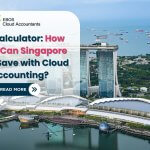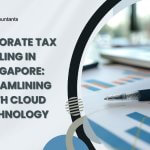SMEs in Singapore are realizing more and more that cloud accounting is a strategic investment with quantifiable results, not just a technical advancement. Business owners may make well-informed decisions about updating their financial operations by knowing the actual cost savings and return on investment from cloud accounting.
Traditional Accounting Costs for Singapore SMEs
Understanding the starting expenses of conventional accounting techniques is crucial before estimating cloud accounting savings. Depending on transaction volume and complexity, Singapore SMEs usually pay between S$2,000 and S$8,000 per month on bookkeeping services. This covers external accounting firms, part-time bookkeepers, and the unstated expenses of manual procedures.
Licenses for desktop accounting software can range from S$500 to S$2,000 per user per year, plus extra costs for data backup, software updates, and IT support. Additionally, a lot of SMEs spend money on distinct payroll, invoicing, and inventory management systems, which results in a costly and disjointed IT stack.
Direct Cost Savings with Cloud Accounting
For complete solutions appropriate for the majority of Singapore SMEs, cloud accounting systems normally cost between S$50 and S$200 per month. When compared to standard bookkeeping services, this translates into immediate savings of 60–80%. By removing extra IT expenses, the subscription model offers technical assistance, data backup, and automatic updates.
Businesses can combine several software programs into a single cloud accounting platform thanks to integration features. Payroll solutions (saving S$50-150 monthly), inventory management systems (saving S$100-300 monthly), and separate invoicing software (saving S$30-100 monthly) are no longer necessary.
Time-Based ROI Analysis
The most important aspect of cloud accounting ROI is time savings. A typical Singapore SME needs 20–40 hours per month to do manual bookkeeping. By automating data entry, bank reconciliation, and report preparation, cloud accounting cuts this down to 5–10 hours.
This time savings equates to an opportunity cost recovery of S$1,000–2,400 per month, given the average hourly rate of SME owners in Singapore, which is between S$50 and S$80. These hours could be used for strategic planning, business development, or revenue-generating endeavors.
Accuracy-Related Savings
Manual accounting procedures frequently lead to mistakes that have a substantial negative impact on Singaporean SMEs in the form of fines, late payments, and lost opportunities. For corporate tax returns, IRAS late filing fines can amount to S$300, while GST filing errors can result in further penalties of up to S$10,000.
Up to 90% fewer errors occur in cloud accounting systems with integrated validation procedures and automated computations. This means that an average SME can save S$500–1,500 in penalties alone each year by avoiding two to three expensive errors.
Cash Flow Optimization Benefits
Better cash flow management is made possible by cloud accounting’s real-time financial visibility. Debtor days are decreased and working capital efficiency is increased with automated invoice reminders and connected payment systems, which usually result in 15–25% faster collection times.
Reducing debtor days from 45 to 35 days improves cash flow by about S$41,600 for a SME with S$500,000 in yearly revenue. At current Singapore interest rates, the interest savings from less borrowing requirements or the opportunity cost of more readily available cash can surpass S$2,000 per year.
Scalability and Growth ROI
Unlike traditional solutions, which require expensive system upgrades or extra user licenses, cloud accounting grows with your company without any problems. Cloud accounting accommodates numerous entities, currencies, and locations without causing proportionate cost increases as Singapore SMEs grow.
The usual S$5,000–15,000 costs of switching to new accounting systems when companies outgrow their current ones are avoided because to this scalability. Because users and features may be added gradually, technology expenses increase in line with income rather than in costly increments.
Professional Services Optimization
Working with outside accountants and tax experts is made easier with cloud accounting. Real-time access to precise financial data improves preparation efficiency and speeds up query resolution, which lowers professional service prices by 30–50%.
The availability of well-structured, automatically reconciled cloud accounting data to auditors usually results in a S$2,000–5,000 reduction in annual audit fees. As tax preparation becomes more efficient, professional rates are decreased and timeliness and accuracy are increased.
Calculating Your SME’s Cloud Accounting ROI
Implementing cloud accounting can result in the following annual savings for a typical Singaporean SME with S$1 million in revenue:
- A decrease in bookkeeping expenses of S$24,000–48,000.
Savings on time (opportunity cost): S$12,000–28,800; savings on error reduction: S$1,000–3,000
• Efficiency in professional services: S$5,000–10,000
• Improvements in cash flow: S$2,000–5,000
Compared to the S$1,200–2,400 yearly costs of cloud accounting, the total annual savings vary from S$44,000 to S$94,800. In just the first year, this yields a return on investment of 1,800% to 3,900%.
Implementation Considerations
Even if the return on investment for cloud accounting is strong, Singapore SMEs should account for implementation costs like as data migration (S$500–2,000), employee training (S$1,000–3,000), and possible short-term productivity loss during the changeover. But because to operational savings, these one-time expenses are usually recouped in two to three months.
Conclusion
Through direct cost savings, operational improvements, and strategic advantages, cloud accounting offers Singapore SMEs an outstanding return on investment. The investment in cloud accounting technology pays for itself many times over and positions businesses for sustained growth in Singapore’s competitive marketplace, with ordinary businesses potentially saving over S$40,000 annually.
For SMEs in Singapore, the question is not if they can afford to use cloud accounting, but rather if they can afford not to make this revolutionary investment in their company’s operations.







